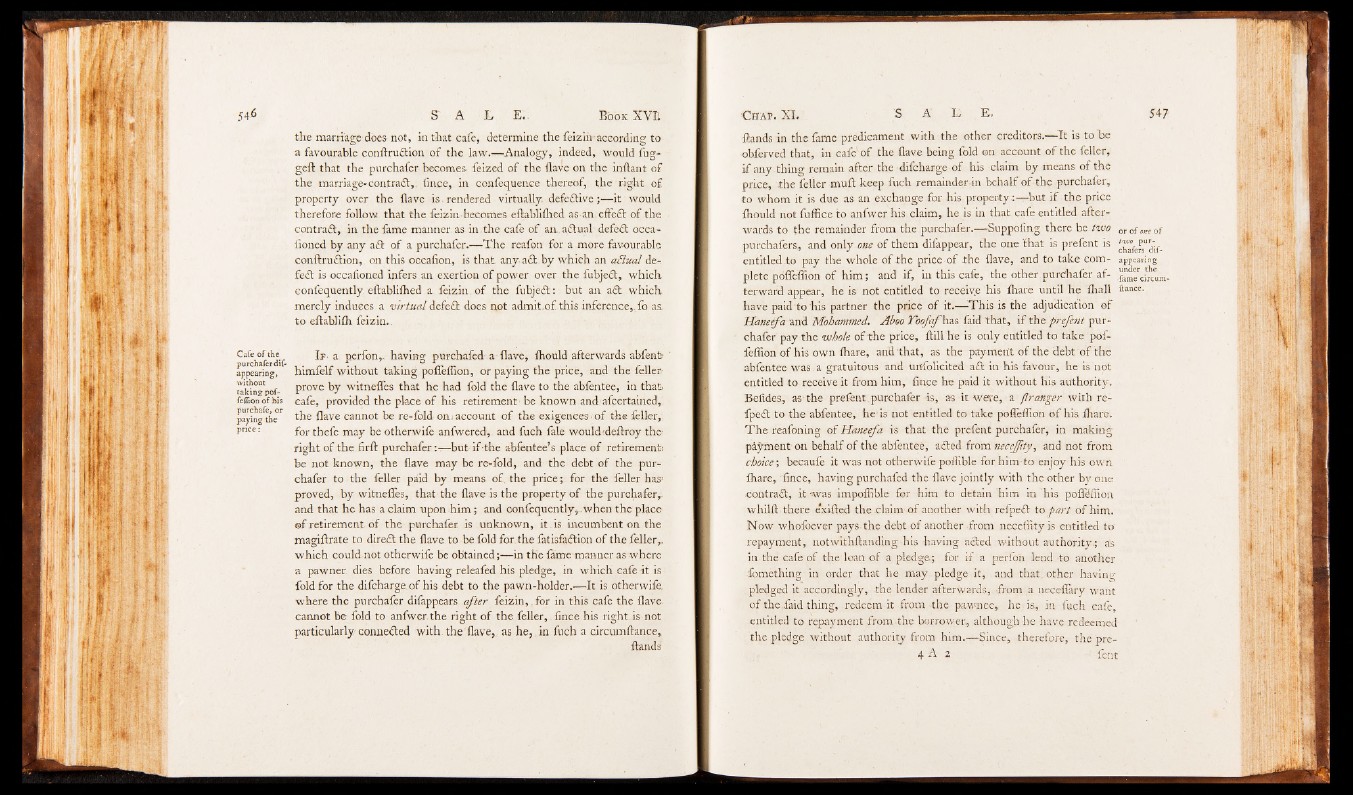
tire marriage-does not, in that cafe, determine the feizirraccording to
a favourable conftruftion of the law.— Analogy, indeed, would fugged
that the purchafer becomes feized of the Have on the inftant of
the marriage-contract,, fince, in Gonfequence thereof, the right of
property over the Have is. rendered virtually, defective;— it would
therefore follow that the feizin-becomes eftablilhed as-an.effeft of the
Contraft, in the fame manner, as in ,the cafe of an, actual defeft o'cca-
lioned by any adt of a purchafer.— The reafon for a more favourable
conftruftion, on this occafion, is that any. adt. by which an actual de-
fedt is occalioned infers an exertion of power over the.fubjedt, which,
eonfequently. eftablilhed a feizin. o f the fubjedt: but an adt which,
merely induces a virtual defedt does not admit.of this inference,..fo as.
to eftablifh feizin..
Cafe o f the
purchafer dif-
appearing,
without
taking poffeffion
of his
purchafe, or
paying the
price:
If . a perlbn,. having purchafed' a-Have, fhould afterwards abfenfe
himfelf without taking poffeffion, or paying the price, and the feller,-
prove by witneffes that he had fold the Have to the abfentee, in that,
cafe, provided the place of his retirement be known and.afcertained,.
the Have cannot be re-fold on;account of the exigences-of the -feller,,
for thefe may be otherwife anfwered, and fuch fale would >deftroy the-
right of the firft purchafer:-—but if-the abfentee?s place of retirement!
be not known, the Have may be re-fold, and the debt of the purchafer
to the feller paid by means of. the price; for the feller has’
proved, by witneffes, that the Have .is the property of the purchafer,.
and that he has a claim upon him; and eonfequently, .when the place
©f retirement of the purchafer. is unknown, it , is incumbent on the
magiftrate to direft the flave to be fold for the fatisfadtion of the feller,,
which could not otherwife be obtained;-—in the fame manner as where
a pawner, dies hefore having releafed his pledge, in which cafe it i s .
fold for the difcharge.of his debt to the pawn-holder.— It is otherwife.
where the purchafer difappears after feizin,,for in this cafe the flave
cannot be fold to anfwer. the right of the feller, fince his right.is not
particularly- connedted with the flave, as he, in fuch a circumftance,
ftands
ftands in the fame predicament with the other creditors.— I t is to be
obferved that, in cafe1 of the flave being fold on account of the feller,’
if any thino- remain after the-difeharge of his -claim by means of the
price, the feller muft keep fuch remainder-iu behalf of-the purchafer,
to whom it is due as an exchange for his property:— but if the price
fhould not fuffice to anfwer his claim, he is in that cafe entitled afterwards
to the remainder from the purchafer.— Suppofing there be two orofomof
purchafers,, and only one of them difappear, the one that is prefent is
entitled.to pay the whole of the price of the flave, and to take com- appearing
plete pdffeflion of him; and if, in this cafe, the other.purcfhafer af-
terward appear, he is not entitled to receive his fhare until he fhall ftanc?:
have paid to his partner the price of it.— -This is the adjudication of
Haneefa and Mohammed. Aboo Yoofafhas faid that, if the prefent purchafer
pay the whole of the price, ftill he is only entitled to take poffeffion
of his own fhare, and‘that, as the pay ment of the debt of the
abfen-tee was a gratuitous and ufl-folicited aft in his favour, he is not
entitled to receive it from him, fince he paid it without His authority.
Befides, a-s-the prefent purchafer-is, as it-were, a fir anger with re-
fpeft to the abfentee, he'is not entitled to take poffeffion of his fhare.
The reafoning of Haneefa is that the prefent purchafer, in making
piyment on behalf of the abfentee, afted from necejfty, and not from
choice; becaufe it was not otherwife poffible for him-to enjoy his own
fhare, 'fince, having purchafed the flave jointly with the other by one
.contraft, it -was impoffible for him to detain him in his poffiffion
whilft there exifted the .claim of another with refpeft to part of him.
Now whofoever pays-the debt of another from neceffity is entitled to
repayment, notwithftanding bis-having afted without authority ;’ as
in the cafe of the loan of a pledge,; .for if a petfon lend to another
fomething in order t-hat he may pledge it, and that,other having
pledged it accordingly, .the lender afterwards, -from a neceflary want
of the .faid thing, redeem it from -the pawnee, he.is,, in fach cafe,
entitled to repayment .from the borrower,, although he have redeemed
the pledge without authority from him.— Since, therefore, the pre-
4 A 2 ■ : lent